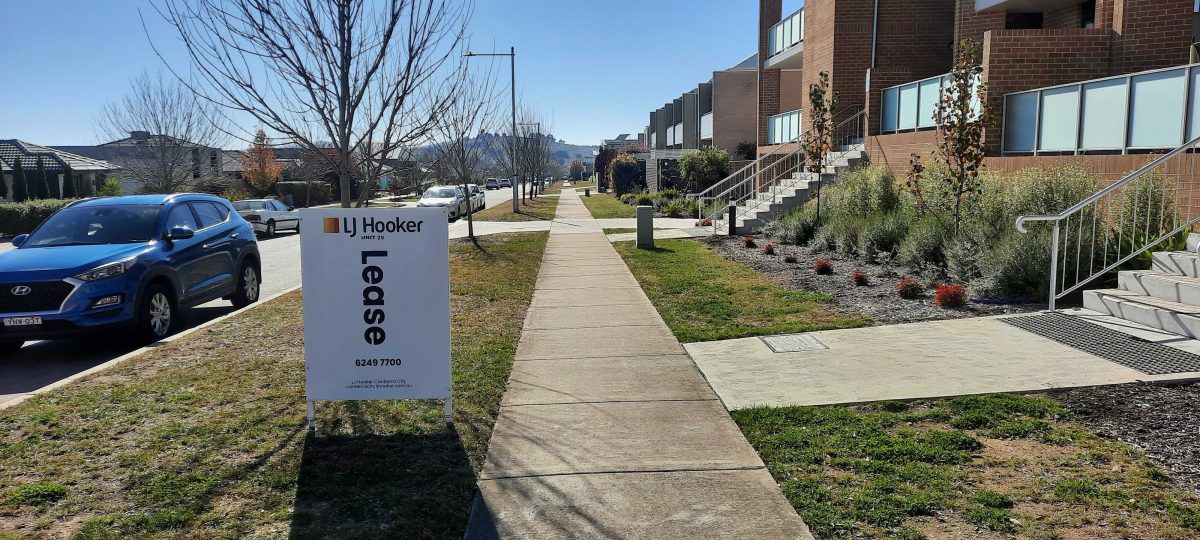
While rents may still be high, increases have been lower and renters report feeling more secure. Photo: Ian Bushnell.
The ACT’s rental laws are helping to reduce rent increases and improve the lot of tenants and their interactions with landlords, according to a new report from the renters’ lobby group.
Better Renting’s Cost of Renting Report found renters in the ACT faced smaller rent increases than anywhere else in the country.
The report is based on a survey of 1400 renters across Australia, including 111 in the ACT.
While the number surveyed in the ACT is small, the report says renters here were also less likely to report a no-grounds eviction, which has been banned in the ACT since April 2023.
They reported greater compliance with rental laws compared with the rest of the country and felt more comfortable advocating for themselves without fear of retaliation.
While overall 76 per cent of renters had received a notice of rent increase, with a median increase of 11 per cent, in the ACT, only 64 per cent of survey respondents reported a rent increase, and the median increase was only 4 per cent.
One ACT respondent described how the ACT rental cap gave them the confidence to negotiate a smaller rent increase.
But landlords were still finding ways to get around the no-grounds eviction law by citing renovations or putting the property on the market and then relisting the property at a higher rent, prompting calls for more oversight and strengthening of rental laws.
ACT Campaigner for Better Renting Sabrina Clarke said that while increased supply was also a factor, the evidence was that the legislative approach in the ACT was working.
“We can be pretty confident that the rental laws we have in ACT have been working and have been giving renters better outcomes than renters elsewhere in Australia,” she said.
“We can certainly see from the data that those experiences have been better.”
Ms Clarke said the number of negative stories from tenants had fallen in the ACT compared to other states and territories.
However, there was more that could be done because while the rate of rent increases was lower than elsewhere, baseline rental costs and rents were still high.
Ms Clarke singled out rent bidding, or the practice of renters offering higher than advertised rents to secure a property, as one area in need of attention.

A boost to rental stock has also contributed to lower rents, particularly in apartments. Photo: Michelle Kroll.
Asked if she was disappointed that the ACT Greens, who have taken credit for driving rental reforms, were not in government, Ms Clark said Better Renting would work with whoever was in power to improve life for renters.
“We have reached out to some of the new members to try to get meetings and make sure we can keep working on more progressive rental legislation in the ACT,” she said.
Ms Clarke rejected arguments from the property industry that the new rental laws, minimum standards and taxes were squeezing landlords, forcing many to sell up.
She said the research showed that landlords were motivated to sell by other kinds of personal factors and not because of rental laws or minimum rental standards.
“Renters deserve to live in affordable, healthy, safe homes,” Ms Clarke said.
“These standards are not really something we should be fighting against … renters should be able to live comfortable lives without having to skip their groceries or their medications to afford their rent and their rent increases, which is unfortunately also something we’ve seen quite frequently from our survey.”
Executive Director of Better Renting Joel Dignam also said the ACT still had work to do.
“People are still dealing with some of the highest rents in the country, and you still have one in two renters saying they are worried about retaliation,” he said.
“It’s important for the incoming government to keep building on a record of success in this area, both through strengthening rental laws and getting more supply online.”
The report’s other national findings were:
- Nine in 10 renters were paying more than they were 12 months before.
- Half of rent increases that took effect in full were over 10 per cent
- One in six notices of rent increase was above 25 per cent.
- One in two respondents said repairs weren’t fixed within four weeks.
- In the past 12 months, 59 per cent of renters said they didn’t bring up issues because they feared retaliation from their landlord or real estate agent.
The report urges rental law reforms, adjusting tax settings, boosting supply, and a cultural change so renters are acknowledged the same way owner-occupiers are.
Better Renting is launching the report ahead of a planned lobby day in Canberra later this month, where 20 renters from across Australia will be meeting with Federal MPs to seek faster federal action on renters’ housing challenges.
The property industry says the focus should be on increasing supply, not demonising landlords and making it harder for them to operate.




















